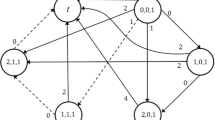Abstract
This paper considers the problem of assigning a common due-date to a set of simultaneously available jobs and sequencing them on a single machine. The objective is to determine the optimal combination of the common due-date and job sequence that minimizes a cost function based on the assigned due-date, job earliness values, and number of tardy jobs. It is shown that the optimal due-date coincides with one of the job completion times. Conditions are derived to determine the optimal number of nontardy jobs. It is also shown that the optimal job sequence is one in which the nontardy jobs are arranged in nonincreasing order of processing times. An efficient algorithm of O(n logn) time complexity to find the optimal solution is presented and an illustrative example is provided. Finally, several extensions of the model are discussed.
Similar content being viewed by others
References
Cheng, T. C. E., andGupta, M. C.,Survey of Scheduling Research Involving Due-Date Determination Decisions, European Journal of Operational Research, Vol. 38, pp. 156–166, 1989.
Ragatz, G. L., andMabert, V. A.,A Framework for the Study of Due-Date Management in Job Shops, International Journal of Production Research, Vol. 22, pp. 685–695, 1984.
Conway, R. W.,Priority Dispatching and Job Lateness in a Job Shop, Journal of Industrial Engineering, Vol. 16, pp. 228–237, 1965.
Eilson, S., andChowdhury, I. J.,Due-Dates in Job Shop Scheduling, International Journal of Production Research, Vol.14, pp. 223–237, 1976.
Weeks, J. K., andFryer, J. S.,A Methodology for Assigning Minimum Cost Due-Dates, Management Science, Vol. 23, pp. 872–881, 1977.
Cheng, T. C. E.,Optimal Due-Date Determination and Sequencing of N Jobs on a Single Machine, Journal of the Operational Research Society, Vol. 35, pp. 433–437, 1984.
Cheng, T. C. E.,Optimal Due-Date Assignment in a Job Shop, International Journal of Production Research, Vol. 24, pp. 503–515, 1986.
Cheng, T. C. E.,An Algorithm for the CON Due-Date Determination and Sequencing Problem, Computers and Operations Research, Vol. 14, pp. 537–542, 1987.
Kanet, J. J.,Minimizing the Average Deviation of Job Completion Times about a Common Due-Date, Naval Research Logistics Quarterly, Vol. 28, pp. 643–651, 1981.
Panwalkar, S. S., Smith, M. L., andSeidmann, A.,Common Due-Date Assignment to Minimize Total Penalty for the One Machine Sequencing Problem, Operations Research, Vol. 30, pp. 391–399, 1982.
Seidmann, A., Panwalkar, S. S., andSmith, M. L.,Optimal Assignment of Due-Dates for a Single Processor Scheduling Problem, International Journal of Production Research, Vol. 19, pp. 393–399, 1981.
Seidmann, A., andSmith, M. L.,Due-Date Assignment for Production Systems, Management Science, Vol. 27, pp. 571–581, 1981.
Orlicky, J.,Materials Requirements Planning, McGraw-Hill, New York, New York, 1975.
Moore, J. M.,An N-Job, One-Machine Sequencing Problem for Minimizing the Number of Late Jobs, Management Science, Vol. 15, pp. 102–109, 1968.
Sidney, J. B.,An Extension of Moore's Due-Date Algorithm, Symposium on the Theory of Scheduling and Its Application, Edited by S. E. Elmaghraby, Springer, New York, New York, 1973.
Kise, H., Ibraki, T., andMine, H.,A Solvable Case of the One-Machine Scheduling Problem with Ready Times and Due Dates, Operations Research, Vol. 21, pp. 121–126, 1978.
Cheng, T. C. E., andChen, Z. L.,Single Machine Scheduling to Minimize the Weighted Number of Early and Tardy Jobs, Technical Report, Department of Actuarial and Management Sciences, University of Manitoba, 1992.
French, S.,Sequencing and Scheduling: An Introduction to the Mathematics of the Job-Shop, John Wiley and Sons, New York, 1982.
Garey, M. R., andJohnson, D. S.,Computers and Intractability: A Guide to the Theory of NP-Completeness, W. H. Freeman, New York, New York, 1979.
Kahlbacher, H. G., andCheng, T. C. E.,Parallel-Machine Scheduling to Minimize Costs of Earliness and Number of Tardy Jobs, Discrete Applied Mathematics, 1993 (to appear).
Author information
Authors and Affiliations
Additional information
Communicated by W. Stadler
This research was supported in part by the Natural Sciences and Engineering Research Council of Canada under Grant OPG0036424. The authors are thankful to two anonymous referees for their constructive comments.
Rights and permissions
About this article
Cite this article
Cheng, T.C.E., Kahlbacher, H.G. Single-machine scheduling to minimize earliness and number of tardy jobs. J Optim Theory Appl 77, 563–573 (1993). https://doi.org/10.1007/BF00940450
Issue Date:
DOI: https://doi.org/10.1007/BF00940450




